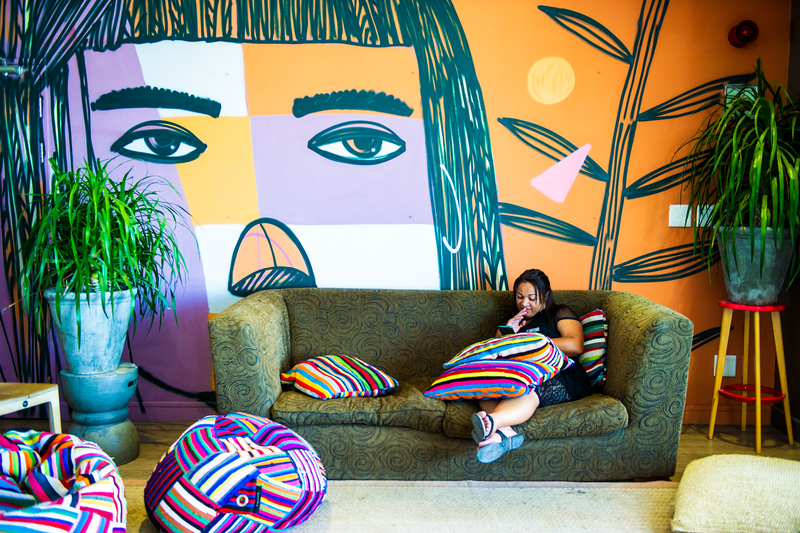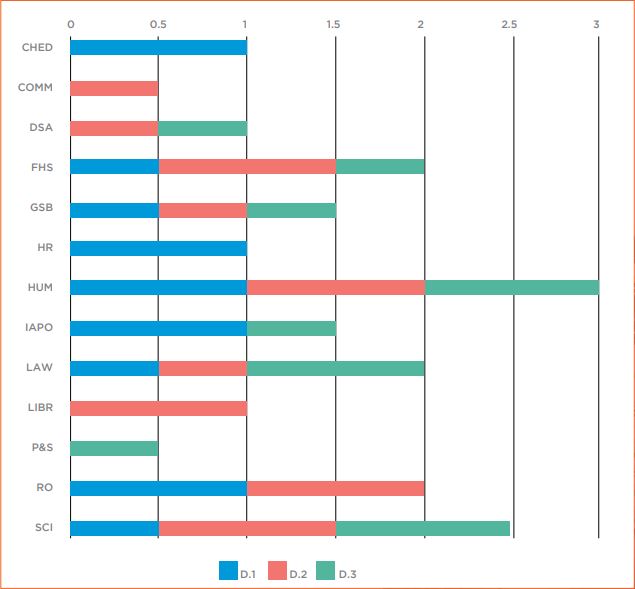Place and space: language, names, symbols, artwork and identity
04 November 2022
How is the university affirming the dignity, acknowledging the contributions and experiences, and placing special attention on those who have been historically marginalised?

What is being tested?
 |
Contribution to policy | D.1 At least one example of contribution to development, amendment, implementation or dissemination of policies or processes related but not limited to heritage, disability, gender, language and/race. |
 |
Transformative interventions | D.2 At least one faculty- or department-wide intervention which contributed to a more transformed, inclusive or diverse campus environment. Eligible actions should focus on inclusion in relation to language, naming of buildings or spaces, symbols or symbolic representations or artworks, or should engage critically with diverse identities. |
 |
Knowledge and advocacy | D.3 Knowledge or advocacy product or communication which explicitly redresses historical privilege and power as manifest in colonialism and apartheid. |
What does the benchmark reveal?
The tension between indigenous land rights and colonial and contemporary urban development in Cape Town is long-standing. A stone’s throw from the UCT campus, indigenous activists have taken a stand against the development of a new Amazon Africa headquarters at a sacred indigenous and environmentally important site at the confluence of the Liesbeek and Black rivers. Activists argued that colonial displacement continues unabated from Dutch and English colonialism to corporate neo-colonialism.
At UCT, similar struggles have emerged over the years. In recent years, through the Sutherland reburial process, the university has been forced to confront its own historical complicity in colonialism and slavery. This benchmark proposed actions which would respond to this history of violence due to colonialism and apartheid, and the contemporary legacy this violence has left. While a small number of departments and faculties met the criteria of this benchmark, the vast majority didn’t conduct strong actions in this area. Conversely, initiatives such as WOAC and the Irma Stern Museum found new inspiration as COVID-19 waned, and conducted exciting actions (featured later in this section). Overall, since 2019 fewer actions have been identified for each year the benchmark data was collected. This means that across faculties and departments, re-curating artworks, rethinking symbols and monuments on campus, or renaming structures and buildings has been deprioritised. This deprioritising of actions responding to the effects and artefacts of colonialism and apartheid is concerning.
 |
Only 50% of the departments and faculties reported contributing to the development or dissemination of policy. The Naming of Buildings Committee (NoBC), WOAC and the Irma Stern Museum initiated projects such as renaming buildings, re-curating artworks or hosting creative educational interventions to create a more welcoming environment. |
 |
Only a small number of departments and faculties developed a knowledge product or communication that responded to historical privilege and power. This can be seen as a gap in terms of responding to the contemporary effects of apartheid and colonialism. |
Which actions contributed to this benchmark?
Several working groups and committees contributed to this benchmark, including the Language Policy Working Group; the work of the Multilingualism Education Project; then NoBC; and WOAC. These committees and working groups ensure that the use of language at UCT, the names of buildings and the artworks on campus are relevant to marginalised groups and respond to their realities. For example, in 2021:
- Some entities (including the Commerce and Law faculties) focused on creating changes to physical spaces by conducting disability audits of their buildings or creating gender-neutral restrooms.
- The Department of Student Affairs manages the Rhodes Must Fall Scholarship and lecture. The scholarship draws on Black Radical Feminism, Black Consciousness and Pan-Africanism, and aims to support activists and scholars at a postgraduate level.
- Many entities (specifically within the FHS) focused on language and linguistic inclusion through supporting students who aren’t first-language English speakers or through offering content and courses on indigenous and local languages.
- The Graduate School of Business hosts a Solution Space venture incubator which provides financial and coaching support to non-traditional entrepreneurs who typically lack access to these resources. In 2021, 30 early-stage enterprises from eight African countries were supported.
- The Religious Observance Task Team collated and debated a number of issues related to tolerance for religious observance and customary practice, with the aim of proposing recommendations for the university in 2022.
- The Law faculty listed the Land and Accountability Research Centre and Centre for Law and Society as sites of knowledge production which contribute towards this benchmark.
- UCT Libraries created a digital platform called Ibali (isiXhosa word for story) which makes connections between and showcases collections dealing with indigenous histories and social issues, such as climate change.
- Other entities shared that individuals have focused strongly on anti-racism in their work. Some individuals from the Science faculty have been collaborating with the Decentering Whiteness working group, as a way to reflect on their own whiteness and the effect of whiteness within higher education.
Entities focused on themes related to gender (including race, disability, and SGBV, indigenous languages and epistemic practice, universal access and ableism, heritage and memorialisation efforts, and a specific focus on under-represented black academics. This focus emerged though research efforts and learning events, with entities relying on online engagements and platforms like WhatsApp to encourage participation.
Who contributed to this benchmark?
Seven faculties and six non-academic departments contributed to this benchmark.
How effective were the actions?
This benchmark aims to capture how the university places special attention on those who are historically and currently marginalised and is acknowledging their contributions and experiences. Related to this benchmark are both institutional efforts and entity-specific interventions which focus on the names of buildings, the curation of artworks, indigenous languages, heritage and memorialisation, and ensuring universal access. These efforts are notable; however, they don’t necessarily critically engage with the afterlife of apartheid and colonialism. For example, the focus on adapting physical spaces for persons with disabilities or gender non-conforming persons does not address dynamics and practices that are ableist or cis-heteronormative in nature. The focus on enabling marginalised individuals or narratives doesn’t respond to how decolonial or activist methodologies and practices are devalued within the institution. To meet this benchmark more effectively, entities within UCT and UCT as an institution need to better understand and respond to the historical and contemporary structures of power that produce marginality within and beyond UCT.
Recommendations
Focus on this benchmark has waned in each year since 2019. While COVID-19 might account for some of the deprioritising of this benchmark, it is also possible that there are insufficient resources or programming for this area of work. More resources, time and effort need to be put into this benchmark area in the future.
An example of a good practice
The FHS created the Sutherland Garden of Remembrance to remember and acknowledge the story of the Sutherland Nine. The Sutherland Nine refers to a group of individuals enslaved and forced to work on a farm in Sutherland in the Northern Cape. UCT unethically procured the remains of these individuals for study in the 1920s. As part of the university’s attempt to offer restitution to the families of the Sutherland Nine and the process of reburial in a dignified and appropriate manner, a garden of remembrance was created in their honour. The garden includes plants, stone and soil from the arid Sutherland region, and is created as a calm, green and reflective space in response to and amid the hostility these nine persons faced.
Transformation special or institutional project: Naming of Buildings Committee (NOBC), Senate Language Policy Committee (SLPC), Works of Art Collections (WOAC) Committee and Irma Stern Museum
Through 2021, the WOAC, the SLPC and the NoBC continued the important work that influences the feel and visual aesthetic of UCT.
The NoBC established a sub-committee to chart the way forward for the proposed renaming of the former Smuts Hall Residence. The building has been named Upper Campus Residence in the interim. In addition to this change, multiple venues in the Kramer Building are to be renamed to commemorate lawyers who contributed to the struggle against apartheid, and the Health Sciences Library was renamed the Bongani Mayosi Health Sciences Library.
The SLPC started introducing and unpacking the new Language Policy Framework to faculties and produced a short briefing document for this purpose. The SLCP also undertook a mapping exercise which captured the use of multilingual pedagogies and interventions within faculties.
WOAC focused on the development of a curatorial policy in 2021. The policy is driven by four principles: (1) ensuring public access; (2) demonstrating leadership on transformation, inclusion and social justice; (3) prioritisation of research and education efforts; and (4) ensuring accountability and the transformation of learning spaces. In addition to this, the Beattie Building, the seat of the Faculty of Humanities administration, was re-curated in 2021. This re-curation included newly acquired works by Hanneem Christian, Athi-Patra Ruga, Banele Khoza, Lady Skollie and others whose works address legacies of gender inequality, racism and queerphobia, and celebrate diverse lives.
During 2021, the Irma Stern Museum hosted a range of installations, events and exhibitions and held several impactful educational interventions, including:
- Interventions dubbed “Open Art House” and “Art House for All” aimed at marginalised school children and children with disabilities, respectively. A holiday programme was also hosted.
- The development of digital learning materials and video materials for various stakeholders.
- A teacher training programme on using creative and arts methods effectively.
The 2021 institutional interventions led by the special projects listed in the previous section offered strong responses to UCT’s colonial and apartheid history and legacy. These responses troubled and dismantled coloniality and suggested new and better ways of doing and being. In contrast, faculty and department interventions and efforts were less strong. This is likely because this area of work was not prioritised in 2021.

Warning signs
In the first three years of capturing data on the benchmarks, entities reported meeting 50–65% of the Place and Space benchmark requirements. Each year, entities reported achieving fewer of the benchmark requirements. This suggests a waning focus on this area of transformation work.

Sparks
While the above challenges are present, there are several hopeful sparks of change. For example, the focus on using art, language and storytelling, on themes such as disability, faith and religion, and on gender are all exciting sparks which could lead to wider positive change.

Transformative awakening
The focus on this area has been weakening and the existing projects in this area are small, and sometimes disconnected from each other. Even with these challenges, upscaling or expanding on successful existing projects could lead to a stronger, more connected and strategic response to this benchmark area in the long-term.
 This work is licensed under a Creative Commons Attribution-NoDerivatives 4.0 International License.
This work is licensed under a Creative Commons Attribution-NoDerivatives 4.0 International License.
Please view the republishing articles page for more information.






